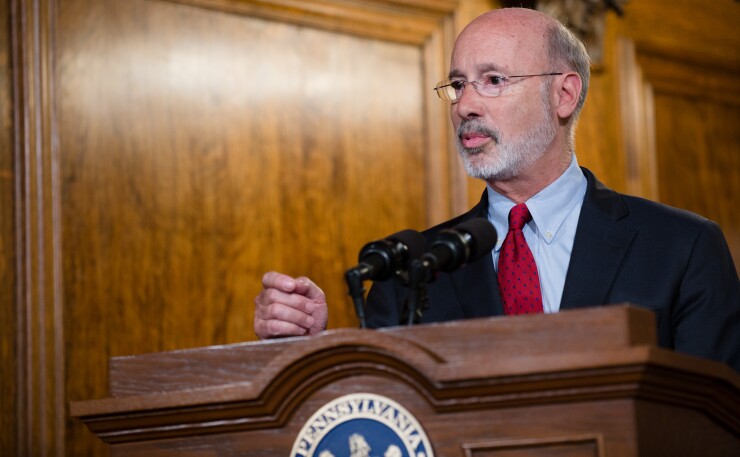Buying time to gauge the financial hit to the commonwealth from the effects of COVID-19, Pennsylvania lawmakers sent Gov. Tom Wolf a five-month, $25.8 billion budget.
The Senate's 44-6 approval on Thursday followed 103-99 passage in the House of Representatives two days earlier. Gov. Tom Wolf, a Democrat who works with a Republican-controlled legislature, is expected to sign the measure.

A companion bill, which the Senate approved unanimously, will distribute $2.6 billion in COVID-19 related emergency aid to counties, nursing homes and other parties.
The budget package provides full-year money for public school budgets, state-supported universities, debt service and school pension obligations. It funds the rest of the state's operating budget lines through Nov. 30, the final day of the two-year legislative session.
Another budget fight could surface in November in a state known for late spending plans.
Wolf had proposed a
The nonpartisan
Fitch Ratings rates the commonwealth's general obligation bonds AA-minus. Moody’s Investors Service and S&P Global Ratings rate them Aa3 and A-plus, respectively. All three assign stable outlooks.
Wolf signed a disaster declaration in March as the coronavirus pandemic escalated. His tiered plan for reopening the state categorizes regions by red, yellow and green phases, depending upon health-related data.
On Friday, the Pennsylvania Liquor Control Board, which runs one of the few government-controlled liquor-store systems in the country, has chosen 60 of its stores to open with limited access Friday in yellow-phase counties.
The controversy over Wolf closing the stores has prompted another call to end the
A bill by Rep. Timothy O’Neal, R-Washington County, would close state stores, privatize the wholesale liquor system and create private outlets for liquor. It parallels legislation that Gov. Tom Wolf, a Democrat, vetoed in 2015.
When the governor closed Pennsylvania’s Fine Wine and Good Spirits stores, residents traveled to New Jersey, Ohio and other neighboring states to buy booze during the pandemic. After the commonwealth’s online system crashed from high demand, Wolf then allowed curbside pickups.
“All that business activity and revenue could have happened in Pennsylvania but was pushed over the borders,” O’Neal said. “Grocery stores and restaurants quickly and efficiently found ways to adapt to the pandemic while the Pennsylvania Liquor Control Board], at Wolf’s direction, caused mass mayhem and turned Pennsylvanians into modern-day bootleggers.”
According to the liquor board’s
Only 9% of the board's sales for FY2019 remained after expenses for transfer to the state's general fund, according to The Commonwealth Foundation, a Harrisburg-based free-market oriented think tank, adding that the board's $185 million transfer amounted to less than 1% of general fund spending.
"The PLCB spends most of its earnings on itself," the foundation said
The foundation also called the liquor board's debt position weak, citing employee retirement liabilities totaling $1.1 billion and a gap of the same amount between its assets and liabilities.





